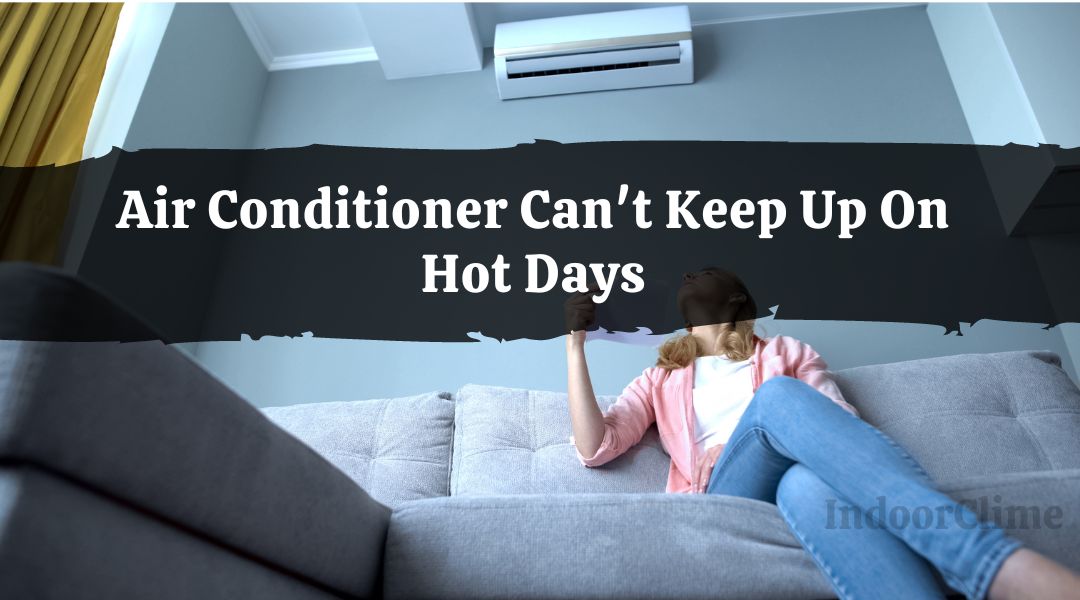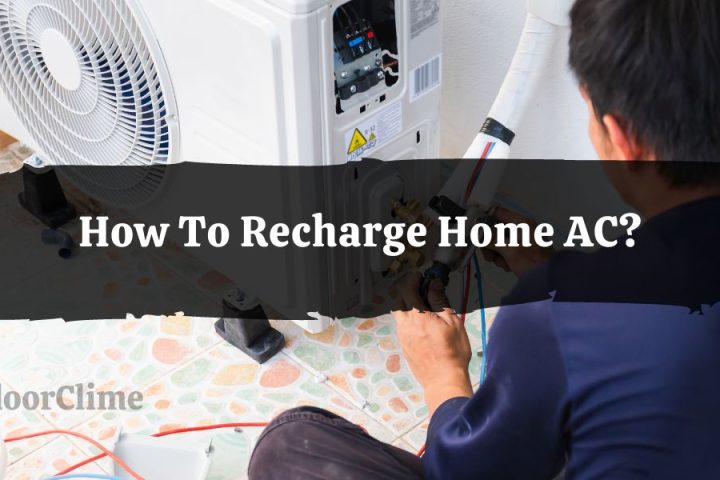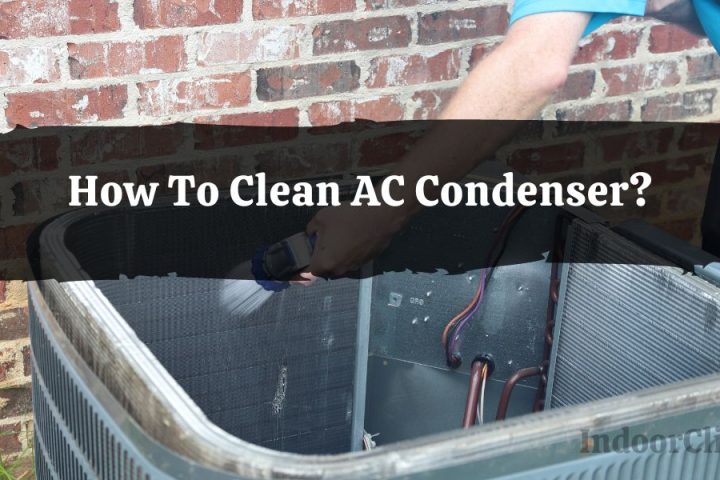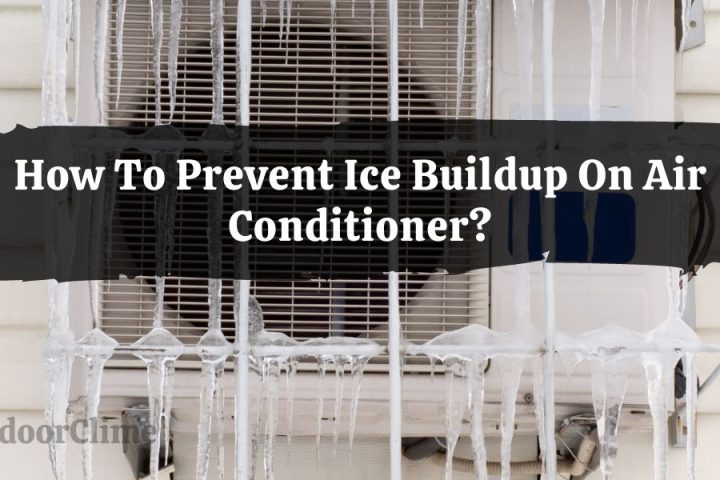Dealing with a malfunctioning air conditioner is frustrating, especially during a heatwave. Before you call for service, though, it may help you understand why your air conditioner can’t keep up on hot days.
Consider these tips that can save you a lot of money on energy bills in the upcoming summer months.
AC units cannot keep up on hot days due to an increase in temperature caused by many things, such as dirty condenser coils, refrigerant leaks, overheating fan motors, and thermostat controls.
Is It Normal For AC Not To Keep Up On Hot Days?
Yes, it’s possible that your AC isn’t doing its job, and the unit may be unable to dehumidify your home.
A properly working air conditioner removes the heat from the air inside your home. As it does this, the moisture in the air condenses, and the condensation is removed through a drain pipe.
For this process to work well, your air conditioning system needs to be sized appropriately for the size of your home.
When high humidity levels, even a properly sized unit can struggle to remove the air’s moisture efficiently, for example, if there’s lots of smoke in your home and no place to go, you may find that even when your thermostat is set at a comfortable temperature, it still feels humid inside, while the heat is being removed, moisture remains in the air.
What Does It Mean When My AC Can’t Keep Up?

Homeowners can find it frustrating when even the most powerful air conditioning units struggle to keep up with the heat outdoors. It is especially true when you’ve set your thermostat to a low temperature and still sweating it out indoors.
But other factors can contribute to why your AC unit is struggling—some require easy fixes and regular maintenance.
Here are a few things to identify before you call an HVAC technician:
- Is it just too hot outside? If the temperature outside has consistently been over 90 degrees, your air conditioning unit will have to work more solid than usual to keep up with the heat. Unfortunately, it can lead to a decline in efficiency and even cause your unit to shut down altogether.
- What is your thermostat set to? First, it’s essential to set your thermostat to a reasonable temperature—if it’s set to an unreasonably low setting, it will be difficult for your AC unit to keep up.
- Have you done regular maintenance? Regular maintenance is something that should always be performed on HVAC units. If you haven’t had yours looked at in a while, now might be the time to check up.
6 Main Reasons Why Air Conditioners Can’t Keep Up On Hot Days
Summer is here, and it’s hot. It means the AC is running all day, and some people have utility bills through the roof. If you find your air conditioner can’t keep up on a hot summer day, there are some common causes.
Here are six main reasons why your AC may not be able to keep up on a hot day:
1. Your AC Might Be At Capacity
Your AC might be maxed out already. It could be due to several things. First, if you have a small house or many people in one room at once, your air conditioner can’t keep up because it’s being asked to produce too much-cooled air to cool down so much space. If your unit was installed years ago or improperly sized for your home’s layout, it might not have enough capacity to cool down hotter rooms in the summertime.
Solutions.
- Best to consider installing a new unit if your budget allows. If not, you’ll need to invest in some fans or look at other methods for keeping cool.
- If your house is large and spacious, you might want to consider a bigger unit or one that’s equipped to handle your home’s dimensions.
- Try closing windows or shutting doors to certain rooms to create more space for the air conditioner to work with.
2. Dirty Condenser Coils

Your condenser coils allow the refrigerant in your unit to change from liquid refrigerant to gas and vice versa.
Unfortunately, when these coils are dirty, they don’t perform as well, making it harder for your refrigerant to absorb heat inside your home.
It means that your AC is working harder than before, and it might be unable to keep up on hotter days because it can’t properly remove the heat inside your home.
Solutions.
- Clean the condenser coils once a year or as your owner’s manual recommends. You can clean them yourself or hire an HVAC professional.
- You can also use a garden hose with a spray nozzle to gently clean these coils.
3. Dirty Evaporator Coils
The evaporator coil is usually inside the air conditioner’s indoor cabinet (or furnace). Unfortunately, this coil becomes dirty over time with regular use; dust collects on these coils, reducing efficiency.
The result is that your system runs longer trying to cool your house down or keep it cool. It wastes energy and increases your cooling costs.
Solutions.
- To clean evaporator coils, you’ll need an evaporator coil cleaning kit.
- Check for any blockages that could stop airflow through the coil.
- If you can’t clean them yourself, call a professional.
4. Refrigerant Leak
If you’re low on refrigerant, your AC won’t be able to function correctly. A professional should set your refrigerant level during installation and then top it off once a year during maintenance.
Because refrigerant is toxic, you can never add more yourself—and it can be dangerous for an unqualified person to try.
Solutions.
- You must find and repair the leak and refill the refrigerant tank with the new refrigerant.
- Try checking for the following signs: Ice or frost forming on refrigerant lines or evaporator coil, warm air coming out of vents, and musty odor from vents.
- Find a licensed technician to inspect and repair your refrigerant lines if they leak.
5. Overheating Fan Motor or Compressor
The compressor and fan motor carry refrigerant gas around the system. If they either overheat or stop working, this will prevent you from cooling down your home efficiently on hot days.
Many issues, including a lack of lubrication, dirty condenser coils, or a loss of power to the unit itself, can cause overheating or failing motors.
Solutions.
- If the problem is that dust has built up on your fan motor, clean off the blades and coils.
- Check your unit’s wires and controls to ensure they’re intact.
- Test the motor if they think it’s overheating.
6. Give Your AC a Head Start
Even though you may have turned on your air conditioner before leaving for work or running errands, you still might not be able to keep up with the hot weather when you return home later in the day.
This is because heat builds up faster than your AC can remove if left running all day long.
Solutions.
- Ensure your thermostat is set to auto instead of leaving for an extended period.
- Raise the temperature about 10 degrees before leaving so it won’t run until you return home, and turn it back down again.
How Can I Help My Air Conditioner On a Hot Day?

If you find yourself feeling a little sweaty during these hot summer days, here are some things you can do to try and help your AC along:
- Close all of your window coverings. It will keep the sun from heating the inside of your home and putting extra strain on your AC system.
- Use your ceiling fans. Ceiling fans don’t cool down a room, but they move cool air around to be more evenly distributed throughout the space, making you feel calmer.
- Refrain from cooking hot meals indoors in the afternoon or evening. Cooking indoors produces heat and humidity, making your AC work even harder to keep your home comfortable.
- Limit your use of large appliances like washers and dryers. These devices also produce heat and humidity, so it’s best to use them in the morning when temperatures outside are lower and less stress is placed on your AC system.
- Provide shade for your air conditioner’s outdoor unit. Sunlight increases the temperature around an AC unit, making it less efficient at cooling down the air before blowing it inside through the ductwork system running through your home.
People Also Ask
How long should AC run on a hot day?
An average air conditioning unit should run for about 15 or 20 minutes on a hot and humid day.
But if it’s been over 80 or 90 degrees all day, your AC unit might run more often to keep up. So it may never turn off sometimes – and that’s fine.
While you probably don’t want to hear that an AC unit that runs constantly isn’t always ideal because of how much energy it consumes, there are some situations where you should pay closer attention:
- First, consume more power and electricity.
- Can overwork your system, leading to a breakdown.
- You will need frequent servicing.
Should I turn AC off if not cooling?
Absolutely. You should always turn a cooling system off if it’s not working correctly, no matter the weather outside.
When you’re in a situation where your AC is broken and the weather is hot, it can be tempting to leave it running if you have a separate heating system—but this can lead to a blown capacitor, which is expensive to repair.
If you aren’t uncomfortable with turning the entire cooling system off, call an HVAC professional to help get your system running again.
At what temperature do air conditioners fail?
If you don’t want your AC unit to fail, ensuring it’s not working too hard is essential.
You’ll risk damaging the compressor if you attempt to run the unit when temperatures are already at 60 degrees or below.
The standard indoor temperature for an air conditioner is 20°F. If the outdoor temperature is 90°F, the coolest an AC can make the inside of the house is 70°F. To keep your AC in good shape, aim to set the thermostat no lower than 20°F below the outdoor temperature. The approved energy-saving temperature during the day is 78°F.





